Cyprus cats are an ideal pet for those who don’t have a lot of free time to dedicate to their furry companion. These cats are active and energetic, making them perfect for households that need a pet to keep up with them.
They are also thick-haired, which makes grooming easy and their coats beautiful even when they’re not being groomed! Cyprus cats can be found in many places on the island of Cyprus, including cities and coasts.
One thing to note when caring for these kitties is that they will need plenty of exercise – like running around the house or playing fetch – as well as lots of love and attention from their human family.
Although they might not always show it, these cats crave affection from their owners just like any other feline friend!
For those looking to provide their beloved feline with the best care, this article is a must-read! We will delve into all aspects of caring for your kitty, from diet and health to grooming and more – so you can ensure your cat lives a long and content life.
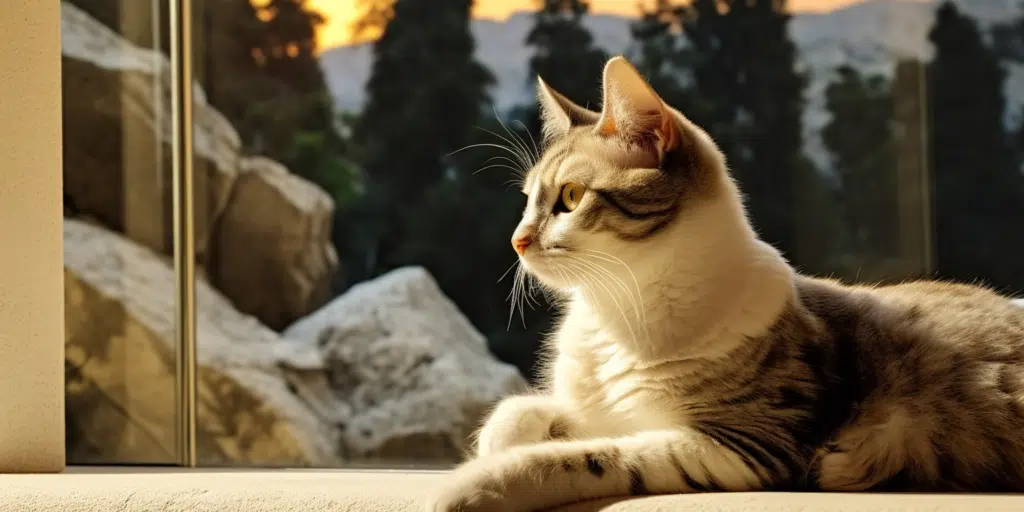
Breed Overview
The Cyprus Cat is an ancient breed that originated from the Mediterranean island of Cyprus. Believed to have been around for thousands of years, these cats predate Egyptian cats by at least four thousand years!
The breed was said to have been brought to a Byzantine monastery in the 4th Century to help with an infestation of snakes and vermin.
This breed has adapted over time, becoming well-suited for life in the mountainous regions of Cyprus. As such, they are rarely seen living closer to water or other bodies of liquid as they prefer higher elevation areas.
Despite their history on the island, they can now be found all over the world thanks to relocation efforts from rescue groups and shelters alike.
The average size for this cat varies depending on its sex – males tend towards being larger than females – but typically ranges between 8-10 pounds when fully grown. Appearance-wise, these cats have long fur with thick coats which come in a variety of colors including black, white, and tabby patterns.
As far as personality goes, the Cyprus Cat is generally known as a gentle lover who enjoys spending time cuddling up next to their owners while purring contentedly away!
These cats also love playing games such as fetch or chasing toys around your home; making them great companions if you’re looking for some feline fun now and then!
Overall, if you’re searching for an independent yet affectionate companion who loves nothing more than snuggles and playtime then look no further than the beautiful Cyprus Cat! With their long history on their namesake island combined with their loyal nature at home.
Identifying Cyprus Cat
The Cyprus Hybrid is a very friendly and affectionate cat that loves spending time with its people. They are also highly interactive and curious, making them perfect for families or households with other pets.
This breed of cat enjoys being around humans and will often seek out attention, cuddling up on your lap when given the chance. Not only do they love playing, but they can also be quite mischievous as they enjoy exploring their environment and trying to open drawers or pawing at door knobs.
These cats require plenty of love, attention, playtime, and interaction to stay happy so if you’re thinking about adopting one make sure you have plenty of time to dedicate to it!
The Cyprus Cat is known for its stunningly diverse range of coat colors. It can come in nearly every color imaginable, except for chocolate, lilac, cinnamon, and fawn. The most common colors are black, white, and tabby variations; however, you may also find silver or grey tabbies as well as solid orange cats.
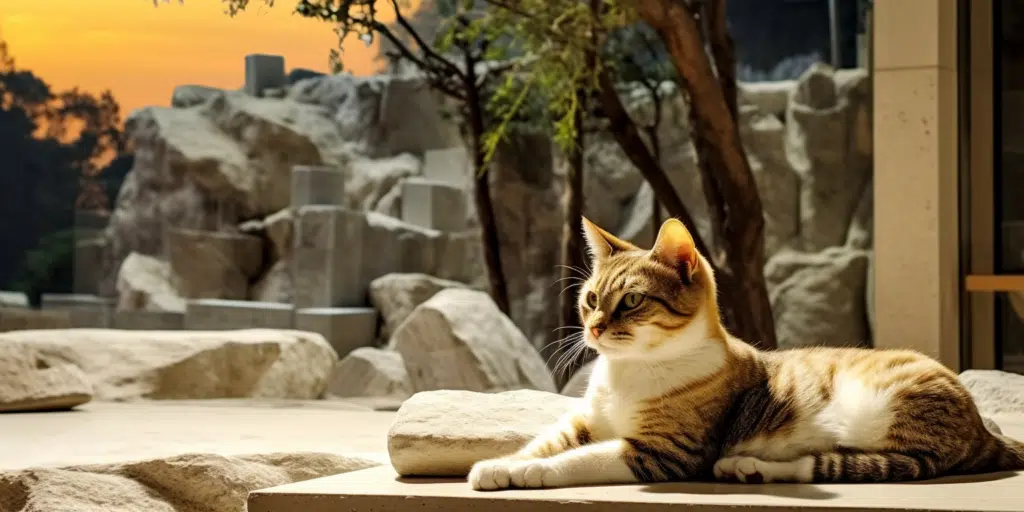
It’s not unusual to see a Cyprus Cat with a combination of two or more different colors – from light browns to dark blues! The possibilities are truly endless when it comes to the variety of shades that this breed displays.
No matter what color variation your Cyprus Cat has, one thing is for sure: it will always be absolutely beautiful!
Personality Traits
The Cyprus cat is an excellent choice for families with young children, as they are known to be gentle and affectionate cats. Early socialization is key when it comes to introducing a Cyprus Cat into a family home so that both the cat and the child can learn how to interact appropriately.
Boundaries must be established between the two early on, helping them understand what behavior is acceptable and which isn’t. When supervised properly during interactions, your Cyprus can become a great companion for your child as they grow up together!
When it comes to other household pets, the Cyprus Cat has been known to form strong relationships with animals of similar sizes such as rabbits or birds. However, each pet’s personality plays a role in how well those relationships will go; some may be more open than others.
If you plan on introducing your new Cyprus Cat into an environment where there are already multiple animals present, make sure all interactions between them take place under supervision at first until everyone feels comfortable around one another.
Rewarding good behaviors from all parties involved will also help create a safe and harmonious environment for everyone!
Activity Level
The Cyprus cat is known for its high energy and active lifestyle. This breed of cat loves to explore, chase, and play with anything it can get its paws on. They are constantly curious about their environment and love learning new things.
Their inquisitive nature leads them to investigate any new areas or objects that come into the household. If a Cyprus cat has access to an outdoor space, they will utilize it as much as possible to explore further than the indoors can offer.
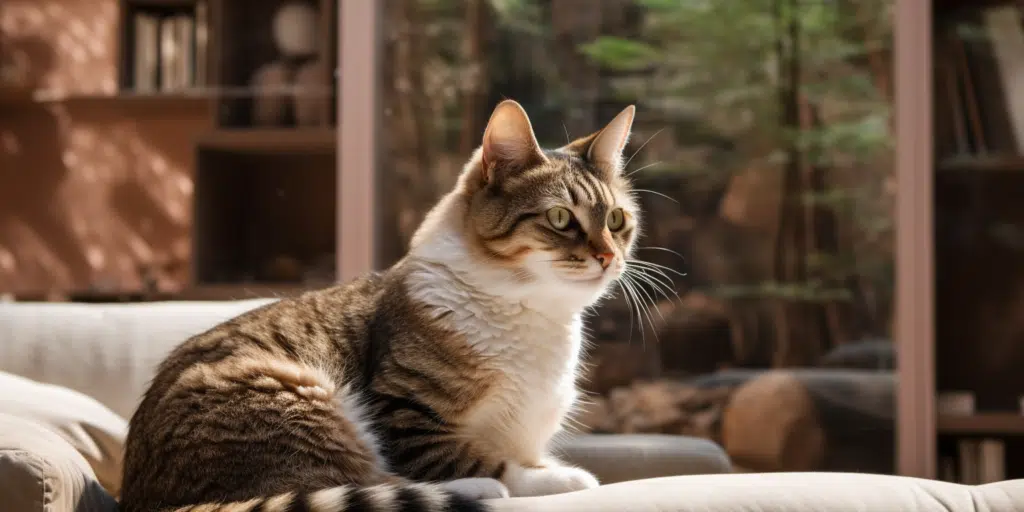
This breed also loves playing with toys and chasing prey items such as small rodents or birds. They often display hunting behavior by stalking their targets before making a swift capture attempt–one of the reasons why they should always be kept indoors unless supervised outside.
These cats require plenty of physical activity each day to remain healthy both mentally and physically; this can include interactive playtime with owners, running around outdoors if safe, or even being given puzzle toys that provide mental stimulation too!
Cyprus Cat Loyalty
The Cyprus cat is undeniably loyal to their family, forming strong bonds and relationships that can last a lifetime. They are known for being loving and social creatures, often seeking out the attention of those they love.
Beyond their loyalty and social nature, the Cyprus cat also brings a lot of joy to its family members. Whether it’s snuggling up on your lap while you watch TV or playing fetch in the backyard, these cats provide hours of entertainment when they’re not sleeping soundly beside you at night.
Not only do they bring fun into your life but also comfort as well; nothing quite compares to having your furball purring away contentedly while you relax after work.
Love Of Water
Cyprus cats are a unique breed of felines that have an interesting affinity for water. Unlike many other breeds of cats, the Cyprus cat is not afraid of getting wet and will often take baths in pools or even jump into swimming pools!
This love for water may be attributed to their island home as the Mediterranean climate offers plenty of opportunities for swimming and other activities involving water. Additionally, it is believed that this love could be due to their long, thick fur which helps keep them warm and dry when they get wet.
The Cyprus cat is also quite active when it comes to exploring bodies of water. They seem to enjoy playing in streams, lakes, and puddles and even a simple bowl filled with water can provide hours of entertainment for them.
Due to its playful nature around water, owners must keep an eye on their pet when near any body of liquid as they can easily drown if left unsupervised.
Overall, the Cyprus cat has become known for its love affair with all things aquatic making it one-of-a-kind among housecats. Its unique relationship with water makes them great companions both indoors and outdoors as they can swim and play while remaining safe from harm’s way at all times!
Trainability
Cyprus cats are highly intelligent and very trainable. They have a strong desire to please their owners, which makes it easy to teach them basic commands and tricks. With patience and consistency, you can easily train a Cyprus cat to use the litter box without much difficulty.
The key is to be consistent with your training methods, rewarding your cat for using the litter box correctly.
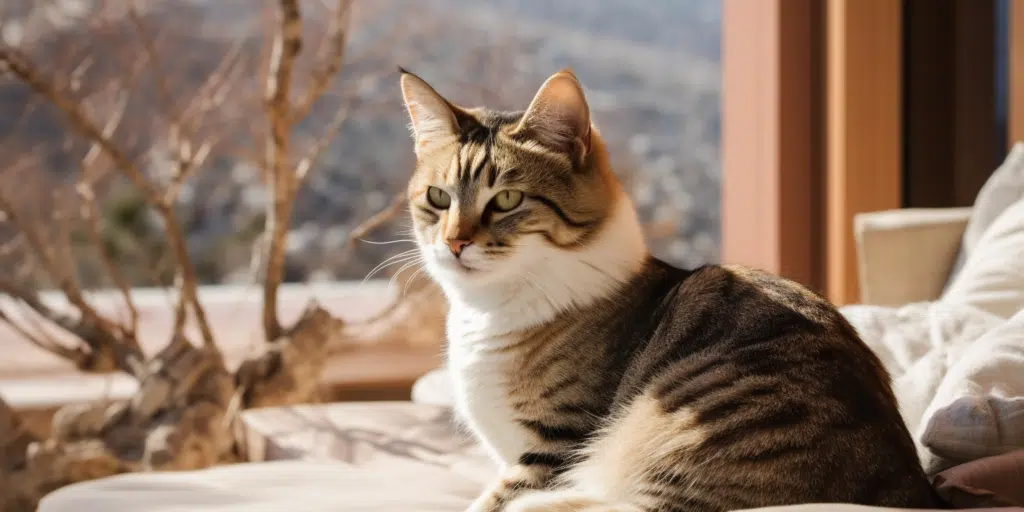
In contrast to their intelligence and trainability, Cyprus cats have outgoing personalities that make them enjoyable companions. They enjoy being around people and love interacting with others in their household or even strangers they meet on walks or visits from friends.
This social nature makes them great family pets who will bond quickly with everyone around them while also responding well when trained properly.
When introducing the litter box into your home, make sure you set aside some time each day for training sessions so that your cat can get used to it gradually instead of feeling overwhelmed all at once.
Be patient throughout the process as there may be times when things don’t go according to plan or when accidents happen – this is normal!
Use positive reinforcement techniques such as treats or praise when your cat does something correctly so that they know what behavior is expected of them in future instances.
Adult Size
The Cyprus cat is a medium-sized cat that is known for its sturdy body and long legs. Most of these cats are between 10 and 12 inches tall, with males being slightly taller than females.
The average weight for this breed can range from 8 to 16 pounds, but some may be lighter or heavier depending on their diet and activity level. The length of the body typically ranges from 18 to 22 inches, giving them an elongated look that many people find attractive.
The growth rate of Cyprus Cats is a fascinating subject to explore. As kittens, they grow rapidly in the first few months of life. During this stage, they can double their original weight and body size within two months.
As adults, their growth rate slows down considerably but continues throughout adulthood as well as old age. On average, Cyprus Cats reach full maturity at around 18 months old and will continue to gain muscle mass up until about 5 years of age.
After that point, the cat’s growth rate begins to slow down again due to natural aging processes.
Life Expectancy
The Cyprus cat is a breed of domestic felines renowned for their long lifespan. On average, these cats can live up to 15 years old if given the proper care and attention they deserve. To ensure that your Cyprus cat reaches its maximum potential life expectancy, it is important to provide them with nutritious food, regular exercise, and plenty of love.
A balanced diet full of essential vitamins and minerals can help boost your pet’s overall health. Additionally, providing plenty of playtime will allow them to burn off any excess energy while helping keep their muscles in shape as they age.
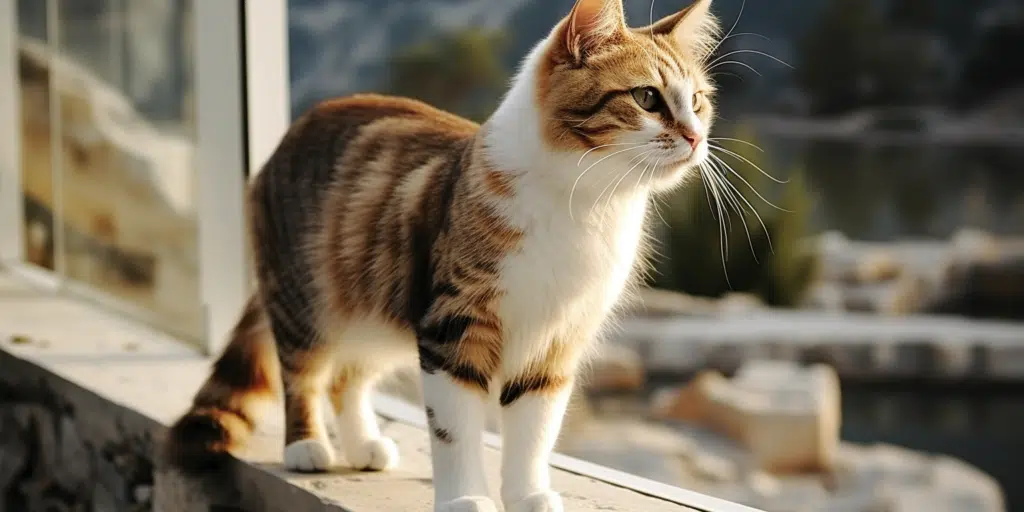
Regular visits to the vet are also necessary to detect any possible illnesses or diseases early on before they become more serious or life-threatening.
Finally, showing lots of affection will help strengthen the bond between you and your furry companion while making sure that both of you experience all the joys this beautiful relationship brings!
Cyprus Cat Care
Caring for a Cyprus Cat is an important responsibility that all cat owners should take seriously. To keep your Cyprus healthy and happy, it’s essential to provide them with proper nutrition and regular veterinary checkups.
In addition to these basics, there are some additional steps you can take to ensure your Cyprus remains clean at all times.
One of the most important things you can do for your Cyprus is provide them with a scratching post or two. This will help promote healthy nail growth and prevent excessive scratching from damaging furniture or carpets.
If possible, place the post near their favorite resting spots so they can easily reach it when needed. Additionally, make sure to trim their nails regularly using appropriate tools as recommended by your vet.
Regular ear cleaning should also be part of your cat’s grooming routine since dirt buildup in their ears can cause infections if left untreated. Your veterinarian can show you how to properly clean out the ear canal while inspecting for any signs of infection or irritation during each visit.
Finally, brushing your cat’s teeth regularly will help maintain good oral health and hygiene over time – something that’s very important for long-term health in both cats and humans!
Talk to your vet about selecting an appropriate toothbrush and toothpaste combination specifically designed for cats before starting this process at home. By taking these simple yet effective measures as part of an overall care plan for your Cyprus Cat, you’ll help ensure they remain happy, healthy, and looking their best!
Diet
When it comes to feeding your Cyprus cat, be sure to follow its natural diet. This means providing a variety of fresh meats as the primary source of nutrition. Turkey, chicken, beef, and salmon are all recommended options for this breed.
You may also include some canned food that is made with real meat protein sources such as tuna or mackerel. It’s important to avoid any food that contains grains or carbohydrates since these can be difficult for cats to digest properly.
In addition to providing fresh meat for your Cyprus cat, you should also ensure that they have access to plenty of water throughout the day. Cats need an adequate amount of fluids to stay hydrated and healthy so make sure there is always a clean bowl available with cool water in it at all times!
Additionally, you should avoid giving your pet any table scraps or foods that are high in fat content such as bacon or cheese since these can lead to obesity and other health problems down the road.
Finally, although treats can be enjoyed occasionally by cats it’s important not to over-indulge them in these snacks otherwise their nutritional intake will become imbalanced which could lead to digestive issues and weight gain over time if left unchecked!
Hydration is an important factor in the health and well-being of all cats, including Cyprus Cats. Providing fresh, clean water daily is essential for the cat’s overall well-being.
It can be beneficial to place the water bowl at least three feet away from any food source because cats’ noses are sensitive and they may not drink as much if their water bowl is too close to their food. Filtered drinking fountains can also be used as a replacement for a traditional water bowl.
Cyprus Cats require more hydration than other breeds due to their long fur that traps heat easily. Owners should keep multiple sources of clean, cool drinking water available throughout the day so that it’s easy for them to stay hydrated even in hot weather or during physical activity.
Water bowls should be cleaned regularly and filled with fresh, cool tap or filtered water each day to prevent bacteria growth and sediment build-up which could make your cat sick if ingested.
Additionally, wet meals containing higher levels of moisture can help supplement a Cyprus Cat’s hydration needs as well as provide additional nutrition benefits over dry foods alone.
Exercise Requirement
It is important to keep Cyprus Cats active and playing to maintain their physical and mental health. Physical activity helps cats stay fit, preventing obesity, which can lead to heart disease and diabetes.
Additionally, regular play sessions help cats expend excess energy that could otherwise be directed toward destructive behaviors such as scratching furniture or urinating outside the litter box.

Mental stimulation is also incredibly important for cats – playtime activities provide enrichment and stimulation for them, helping reduce stress levels. Playing also encourages positive behavior like bonding with human family members through interactive toys or games of chase.
Regular playtime strengthens the bond between cat and owner while providing an enjoyable experience for both pet parent and pet alike!
Shedding Levels
Shedding levels in Cyprus cats vary depending on the stage of their life. At a young age, they tend to shed less than older cats because of their short coats. However, as they reach adulthood, shedding increases due to the thicker fur that is developed.
During this time, cat owners need to groom and brush their Cyprus cat regularly to keep the shedding at a minimum and prevent the matting and tangling of fur.
When a Cyprus Cat enters its senior years, it may start to shed more than usual due to weakened hair follicles or hormonal changes. To help manage this increased shedding level, owners should give them regular baths using a mild shampoo specifically made for cats.
Additionally, brushing your furry friend every day can also help reduce any excess fur that might be present on furniture or carpeting around the home. Taking these steps will ensure that your beloved kitty remains healthy and comfortable throughout her golden years!
Health Issues
The Cyprus Cat is susceptible to a variety of common diseases, such as feline immunodeficiency virus (FIV), feline leukemia (FeLV), and calicivirus. It is also at risk for flea and tick infestations, respiratory infections, eye problems, dental disease, parasites, and some forms of cancer.
To reduce the risk of any health problems or illnesses that may affect this breed it is important to provide regular vet checkups as well as providing proper nutrition and grooming. Additionally keeping up with parasite prevention treatments such as flea/tick control will help keep your cat healthy in the long run.
Poor diet and living conditions can have a significant negative impact on the health of Cyprus cats. Poor nutrition can lead to deficiencies in essential vitamins, minerals, and proteins that are necessary for proper growth and development.
In addition, inadequate housing or lack of access to clean water can cause the spread of parasites and infectious diseases. To prevent these adverse health effects, it is important to feed your cat a balanced diet that includes all the essential nutrients needed for good health.
Additionally, providing your cat with a comfortable and safe home environment will ensure its well-being as well as help protect against external threats such as predators or extreme temperatures. Regular veterinary check-ups are also beneficial in catching any potential problems before they become serious issues.

Buying Tips
- Look for a reputable breeder: When looking for a Cyprus Cat, it’s important to find a reputable breeder who can provide you with health records and genetic information about the kitten. Ask questions about the litter’s medical history and also inquire about any potential genetic issues that may be present in the cat’s family line.
- Research their temperament: The Cyprus Cat is known for its sweet personality and affectionate nature, so make sure you research the cats’ temperaments before purchasing one to ensure they fit into your family or lifestyle.
- Visit with them first: It is always best practice to visit with your prospective pet before taking them home, if possible! This will help ensure that there are no underlying health issues or behavioral problems that could arise later on down the road as well as allow you to bond with your future companion before bringing them home permanently.
- Get vet checked: Make sure all kittens have had a full veterinary checkup before purchase, including shots, deworming treatments, and flea prevention – this will help make sure your kitten stays healthy throughout their entire life!
You Will Need: Cyprus Cat Names: 250+ Amazing Names & How To Select One!

Conclusion
In conclusion, the Cyprus Cat is a unique and charming breed that is well-suited for many types of families. They are friendly and playful, but can also be independent when desired. With their long, luxurious coat and stunning blue eyes, these cats make an attractive addition to any home.
They are relatively low maintenance compared to other breeds and with proper care, they can live a long life full of love and companionship. All in all, if you’re looking for a beautiful cat that has both personality and beauty then the Cyprus Cat should be at the top of your list!